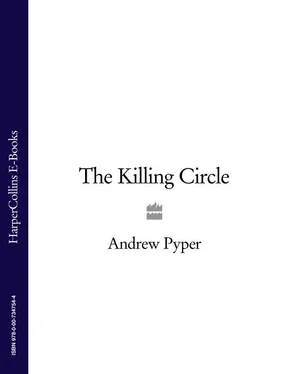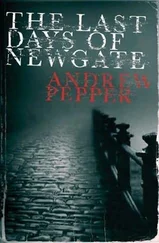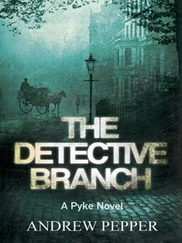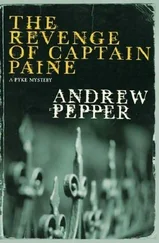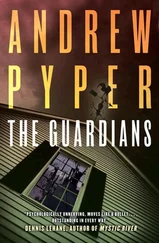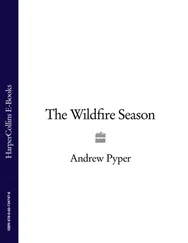"Is it?"
And before I can tell if she’s joking or not, she opens the door and starts up the stairs.
The room is so dark I can only stand at the entrance, hands feeling for walls, a light switch, the leather jacket girl. All I can see for sure are the candles oozing wax over the two distant window sills, the snow outside falling fast as TV static. Though I followed Evelyn up the stairs, she now seems to have disappeared into the void that yawns between the doorway and the windows.
"Glad you could come."
A male voice. I spin around, startled. This sudden movement, and my boots slipping on the puddle of snowmelt over the floorboards, makes me lose my footing. Someone releases a coquettish gasp. In the next instant I realize it was me.
"We’re over here,” the voice says.
The dark figure of a stooped man passes in front of me, drifting toward what I now can see is a circle of chairs in the centre of the room. Boots kicked off, I slide over to one of the two unoccupied places.
"We’re just waiting for one more,” the voice says, and I recognize it only now as the same as the one on the phone. Conrad White. Never-heard-of author and poet, now taking his seat across from mine. The sound of his lullabye voice also brings back the feeling I got when I first spoke my desire to write a book. There had been a pause, as though he was measuring the depth of my yearning. When he spoke again, I wrote down the details he gave me without really hearing them. His words seemed to come from somewhere else, a different time altogether.
All of us wait for the voice to begin again. If there really are six of us sitting here, we are still as dolls. Only the faint tide of our breaths to be heard, taking in the vapours of red wine and incense from the rug beneath our chair legs.
"Ah. Here he is."
Conrad White rises to welcome the last member of the circle to arrive. I don’t turn to see who it is at first. But as a second pair of feet step deliberately forward (and with boots left on), I sense some of the others shrink in their seats around me. Then I see why.
A sloped-shouldered giant steps forward from out of the darkness. At first he appears headless—there’s a ridiculous second when I glance down to his hands to see if he carries his own skull—but it is only the full beard of black wires that obscures most of his face. Not his eyes though. The whites clear, unblinking.
"Thank you all for coming. My name is Conrad White,” the old man says, sitting again. The bearded latecomer chooses the last chair—the one beside mine to the left. Though this saves me from having to look at him, it allows me a whiff of his clothes. A primitive mixture of wood smoke, sweat, boiled meat.
"I will be your facilitator over the next four weeks,” Conrad continues. "Your guide. Perhaps even your friend. But I will not be your teacher. For writing of the truest kind—and that , I’m assuming, is what all of us aspire to—cannot be taught."
Conrad White looks around the circle, as though giving each of us the opportunity to correct him. None do.
He goes on to outline the ground rules for the meetings to come. The basic structure will involve weekly assignments ("Little exercises to help you feel what you see "), with the bulk of time spent on personal readings from each of our works-in-progress, followed by commentary from the other members. Trust is crucial. Special note is made that criticism, as such, will not be tolerated. Instead, there will be "conversations". Not between ourselves, but "between a reader and the words on the page". At this, I feel a couple of heads nodding in agreement off to my right, but I still don’t look to see who it is. Somehow, so long as he’s speaking, I can only look straight ahead at Conrad White. It makes me wonder if it’s not only shyness that holds my stare. Perhaps there is something more deliberately occult in the arrangement of our chairs, the candles, the refusal of electric light. If not enchantment, there is definitely a lightheadedness that accompanies his words. A vertigo I can’t shake.
When I’m able to focus again I pick up that we’re now being told about honesty. It’s the truth of the thing that is our quarry, not mastery of structure, not style. "Story is everything,” the voice says. "It is our religions, our histories, our selves. Only through story can we hope to become acquainted with experiences other than our own."
In a different context—a room with enough light to show the details of faces, the hum of institutional central air, EXIT signs over the doors—this last promise might be overkill. Instead, we are moved. Or I am, anyway.
Now it’s time for the obligatory "Tell us a little bit about yourself” roundabout. I’m terrified that Conrad will start with me. ("Hi. I’m Patrick. Widower, single dad. There was a time I dreamed of writing novels. Now I watch TV for a living.") Worse, he ends up choosing the woman sitting immediately to my right, someone I have so far sniffed (expensive perfume, tailored leather pants) but not fully seen. This means I will be last. The closer.
As each of the members speak, I play with the dictaphone in the outside pocket of my jacket. Push the Record button, Pause, then Record again, so that I create a randomly edited recording. It’s only when they’re halfway round the circle that I realize what I’m doing. Not that this stops me.
The good-smelling woman introduces herself as Petra Dunn. Divorced three years ago, and now that her one child has left for university, she has found herself "mostly alone” in the midtown family home. She names her neighbourhood—Rosedale—meaningfully, even guiltily, as she knows this address speaks of an attribute not lost on any of us: money. Now Mrs Dunn spends her time on self-improvement. Long runs in the ravine. Charity volunteering. Night courses on arbitrary, cherry-picked subjects—Pre-Civil War American History, The Great Paintings of Europe Post-World War II, the 20 Classic Novels of the Twentieth Century. But she became tired of seeing "different versions of myself” in these classrooms, "second or third time around women” not seeking to be edified but asked out by the few men who prowled the Continuing Studies departments, men she calls "cougar hunters". More than this, she has felt the growing need to tell a story concerning the life she might have lived if she hadn’t said yes when the older man who would become her husband offered to take her to dinner while she was working as a bartender at the Weston Country Club. An unlived existence that would have seen her return to her studies, a life of unpredictable freedoms, instead of marrying a man whose free use of his platinum card she’d mistaken for gentlemanly charm. A story concerning "A woman like me but not…"
And here Petra Dunn pauses. Long enough for me to steal a look at her face. I expect to see a woman in her fifties who’s been silenced by her fight with tears. Instead, I’m met with a striking beauty not much older than forty. And it’s not tears, but a choking rage that has stolen her words.
"I want to imagine who I really am,” she says finally.
"Thank you, Petra,” Conrad White says, sounding pleased at this start. "Who’s next?"
That would be Ivan. The bald crown of his head shining faintly pink. Shoulders folded toward his chest, his frame too small for the plaid work shirt he has buttoned to his throat. A subway driver. A man who too rarely sees the light of day ("If I’m not sleeping, either it’s night, or I’m underground"). And lonely. Though he doesn’t confess to this outright, he’s the sort who wears his chronic bachelorhood in the dark circles under his eyes, the tone of defeated apology in his voice. Not to mention the shyness that prevents him from making eye contact with any of the circle’s women.
Читать дальше
